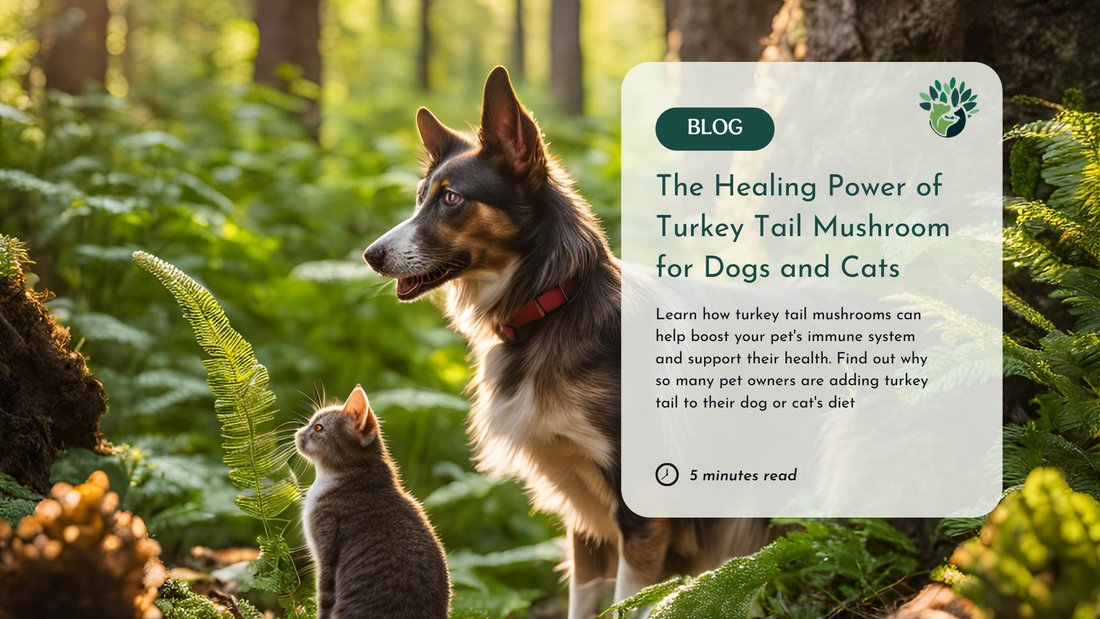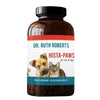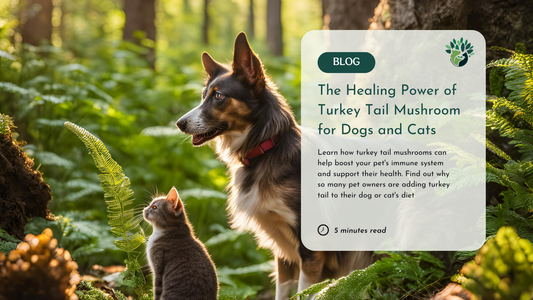Turkey tail mushrooms, known scientifically as Trametes versicolor, are famous for their powerful medicinal properties, specifically their immune-boosting effects. Originally popular in traditional Chinese medicine, these mushrooms have earned attention among holistic veterinarians and pet owners for their health benefits in dogs and cats. Let’s explore how turkey tail mushrooms can benefit your pet, the appropriate dosages, and considerations for safe use.
Turkey Tail Mushroom

Turkey tail mushrooms are a type of polypore mushroom that grows on tree trunks and decaying wood. Named for their colorful, banded appearance resembling a turkey’s tail, these mushrooms are packed with nutrients and bioactive compounds, particularly polysaccharides like polysaccharide-K (PSK) and polysaccharopeptide (PSP). These compounds are responsible for the mushroom’s potent antioxidant, immune-supportive, and anti-inflammatory properties.
Benefits of Turkey Tail Mushroom for Dogs and Cats
Turkey tail mushrooms offer several health benefits for both dogs and cats:
1. Immune System Support
Turkey tail is best known for its ability to boost immune function, thanks to the PSK and PSP polysaccharides. By enhancing immune response, turkey tail mushrooms can help dogs and cats fight infections, reduce inflammation, and potentially inhibit tumor growth.
2. Cancer Support
While not a cure, turkey tail mushrooms may provide adjunct support for pets undergoing cancer treatment. A study conducted by researchers at the University of Pennsylvania’s School of Veterinary Medicine found that a compound derived from the Coriolus versicolor mushroom, also known as turkey tail, significantly extended survival times in dogs diagnosed with hemangiosarcoma. Dogs receiving a formulation called I’m-Yunity, which contains polysaccharopeptide (PSP)—an immune-boosting compound in the mushroom—had median survival times that far surpassed typical outcomes for this aggressive cancer. In fact, some dogs in the study lived over a year with no other treatment than the mushroom compound, showing PSP’s potential as a complementary therapy for improving survival rates and quality of life in canine cancer. Many veterinarians recommend turkey tail mushrooms as a natural complementary therapy for pets with cancer.
3. Digestive Health
Turkey tail mushrooms contain prebiotics that promote a healthy gut microbiome. This helps improve digestion, nutrient absorption, and overall gut health. Pets with sensitive stomachs or those on antibiotics may benefit from these natural prebiotics.
4. Anti-Inflammatory Benefits
Chronic inflammation is at the root of many health issues in pets, including arthritis, allergies, and autoimmune diseases. Turkey tail mushrooms have natural anti-inflammatory properties, making them helpful for pets with inflammation-related issues.
Choosing the Right Turkey Tail Supplement

When selecting a turkey tail mushroom supplement for your pet, look for high-quality, organic products free from fillers or artificial additives. Powdered extracts and capsules are common options and can be mixed with food or administered directly. Be sure to choose a product specifically formulated for pets to ensure it meets purity and safety standards.
Turkey Tail Mushroom Dosage for Dogs and Cats
The correct dosage of turkey tail mushroom depends on your pet’s weight, health condition, and overall sensitivity to supplements. It’s important to consult with your veterinarian before adding any supplement to your pet’s diet. However, general guidelines suggest:
- For Dogs: A common dose is 10-15 mg of turkey tail mushroom extract per pound of body weight, administered once or twice daily.
- For Cats: Cats are generally more sensitive than dogs to new supplements, so start with a low dose of 5-10 mg per pound of body weight and monitor for any adverse reactions.
Potential Side Effects and Considerations
While generally safe, turkey tail mushrooms may cause mild digestive upset in some pets, especially if introduced too quickly. Start with a low dose, and gradually increase as your pet’s tolerance allows. Avoid turkey tail mushrooms for pets with mushroom allergies or those with known hypersensitivities.
Additionally, always discuss any supplement with your veterinarian, especially if your pet is on medications or has a pre-existing health condition.
Conclusion
Turkey tail mushrooms offer promising health benefits for dogs and cats, from supporting immune function to providing antioxidant and anti-inflammatory effects. With the right dosage and product, these mushrooms can be a great addition to your pet’s wellness routine. Always consult with your vet before introducing any supplement, and enjoy the peace of mind that comes with natural, supportive care for your beloved pets.














